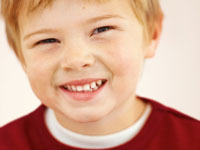Child Dental Health and Baby Teeth Care

Your family dentist is treating the babies of Baby Boomers now, lots and lots of them! But the new generation can expect entirely different child dental health experiences than Mom and Dad remember. Fluorides and sealants have virtually eliminated the rampant tooth decay problems of the early '50s. For Baby Boomer's Babies, cavity prevention should be, well, a piece of cake.
Teething: Baby teeth do grown-up duty
Primary teeth work hard. Those 20 teeth pave the way for permanent teeth. If they're lost prematurely, replacement teeth can crop up in unexpected, and unhealthy, places. Keep every tooth you can in that young noggin.
Boys being boys
Boys, young and old, have written the book on knocked-out teeth. If it's not a skateboard accident, it's falling off fences. But since girls are participating in sports more frequently now, statistics are expected to equalize. Good argument for a mouth guard.
Glad to meet you, Doc
That all-important first visit to the pedodontist (pediatric dentist) should come early on. The family dentist needs a little time to gain trust, so he or she would rather see a child at a young age, before he or she needs to see a drill because of cavities.
What can a parent do when the baby's brand new?
Get your child used to the feeling of clean teeth. Child dental care should begin in babyhood before teething begins by gently rubbing the teeth and gums with a pad of gauze after every feeding. This is when positive dental health attitudes begin. And never put your baby to bed with a bottle full of milk. Cavities can develop even before a child's teeth have erupted from what is known as baby bottle tooth decay.
The Tooth Fairy, bull or bear market?
What's the going rate for a lost baby tooth? In an informal survey, the highest reward for a tooth under the pillow was $5.00, reflecting a very good year for the child! More commonly, the payment ranges from 25¢ to a dollar. A youngster who banks all his money from the tooth fairy can put away $5-$20 for a rainy day.
Hey, Dude, rad braces!
Who ever thought braces could be a fashion statement? Check it out: retainers now come in neon and glow-in-the-dark colors, and elastics can be had in Monster Purple and Slime Green. Allllriiiiiight.
Barnyard pediatric dentistry
Lucky for us it's the 21st century. Dental folklore in the mid-1800's proposed this treatment for growing youngsters: "To make the teeth of children grow hastily, take the brain of a hen and rub the gums therewith." If nothing else, there was fried chicken for Sunday dinner, anyway.
Different strokes
A study of tooth brushing techniques in groups of children aged 7 through 11 shows definite styles of brushing, according to age. Younger children use long, exuberant, not-too-effective strokes (parents must help!) and fewer of them; older kids use more pressure and more frequent, shorter strokes. Just remember what every pediatric dentist will tell you: the key to good child dental health is practice, practice, practice.

+Jim Du Molin is a leading Internet search expert helping individuals and families connect with the right dentist in their area. Visit his author page.
Dental Care and Baby Teeth, Something To Smile About

Your child's first baby tooth is another milestone in the growth of a child. Parents love to celebrate the tiny, yet momentous steps that pave a child's healthy development.
Babies are born with their primary teeth formed underneath the gums, but they don't start appearing until many months later, usually between six to seven months after birth; however, there is considerable variation in the timing. By the time children are three years old, they usually have a full set of 20 primary teeth
Around age six, your child's jaws begin growing to make room for the permanent teeth. The roots of the teeth anchor them in the bone. As the permanent teeth start to push their way to the surface, the roots of the baby teeth dissolve completely and then the teeth fall out (exfoliate). Eventually, the roots of each baby tooth lose their anchoring power and are nudged out.
Each baby tooth should be replaced by a permanent tooth. The growth that occurs in the back of the jaws creates space for the additional 12 permanent molars.
When Should Children's Dental Care Begin?
Children's dental care should begin within just a few days after birth. Right after each feeding, wipe your baby's gums and inside of the cheeks, roof of the mouth and tongue with a clean damp washcloth or wet gauze pad to remove plaque, the sticky film containing decay-causing bacteria.
As soon as teeth begin erupting through the gums, continue proper dental care by brushing them with a soft-bristled brush. Do not use toothpaste. Regularly check your baby's teeth for any changes. If you notice any white or stained areas, see a pediatric dentist. Around the age of three when each baby tooth has erupted, dental care can continue as you begin flossing your child's teeth (if there is no space between the teeth).
Never let your child fall asleep at naptime or bedtime with a bottle of anything other than water! Milk, fruit juice, formula, or sweetened liquids contain sugars and can cause cavities and make dental care more difficult.
Each Baby tooth is important to your growing child's long-term dental care and oral health. Dental care is simple, yet essential, for a happy, healthy smile.
Since Each Baby Tooth Will Fall Out Anyway, Why Is It Important To Care For Them?
The primary teeth pave the way for your child's permanent teeth. They serve as the foundation for a healthy mouth and gums and proper positioning of permanent teeth.
The primary teeth help children to chew easily, speak clearly and put a great looking smile on their faces. They also provide structure to help shape their faces. If a baby tooth becomes broken or decayed and are left untreated, that can affect your child's erupting permanent teeth, cause them pain and even contribute to other health problems.
Primary teeth serve as natural space maintainers, holding the space open until the permanent teeth are ready to take their place. If baby teeth are lost too early, the other teeth can drift out of their position and invade the empty space. This might cause permanent teeth to come in crooked or unable to erupt into the gum, which leads to malocclusion.
It also can cause a permanent tooth to erupt prematurely, which isn't good for your child's long-term dental health. Be sure to seek dental care if a baby tooth is lost too early.
by Brian J. Gray, DDS, MAGD, FICO

+Jim Du Molin is a leading Internet search expert helping individuals and families connect with the right dentist in their area. Visit his author page.













